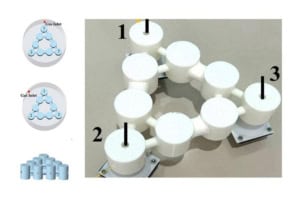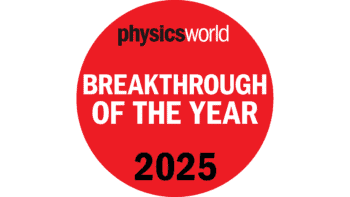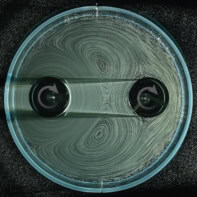
In 2019, researchers discovered that two intrinsically magnetic materials, MnBi2Te4 and MnBi2Te7, can behave as topological insulators – materials that are electrically insulating in bulk, but conduct electricity well on the surface. A team led by Yangpeng Qi from ShanghaiTech University has now demonstrated that it is possible to induce phase transitions in these layered heterostructures by applying high pressures to them, thereby tuning their crystal structure and electronic properties. The results could further our understanding of the interplay between magnetism and topology in these and related materials, they say.
In addition to their unusual conducting behaviour, topological insulators can also exhibit various exotic quantum effects, including the quantum anomalous Hall effect (QAHE) and quantum phases such as axion insulating states. However, many of these effects only appear when the materials are doped with magnetic impurities. The drawback to such doping is that it also introduces disorder in the material’s crystal lattice, making it difficult for researchers to study any quantum phenomena present.
Similar crystal structure to Bi2Te3
Intrinsically magnetic topological insulators such as MnBi2Te4 and MnBi2Te7 avoid this problem, crystallizing instead into an orderly, layered structure similar to that of Bi2Te3, which is a typical topological insulator at ambient conditions. In their work, Qi and colleagues applied pressures of up 50 GPa to MnBi2Te4 and MnBi2Te7 using a diamond anvil cell apparatus that squeezes a sample between the flattened tips of gem-grade diamond crystals. The small size of the tips (400 microns) make it possible to reach such high pressures with only small applied forces.
The researchers performed high-pressure resistivity measurements within this cell, as well as in situ high-pressure Raman spectroscopy and synchrotron X-ray diffraction. The latter experiments were performed at the Advanced Photon Source and the Shanghai Synchrotron Radiation Facility.
Antiferromagnetism gradually disappears as pressure increases
Qi and colleagues found that the antiferromagnetism normally displayed in MnBi2Te4 and MnBi2Te7 gradually disappears as pressure increases, while the conductance and crystal structure of the material also dramatically changes. However, through ab initio band structure calculations, the team discovered that applied pressure does not change the topological nature of the two systems until a structural phase transition occurs at a pressure of more than 16 GPa. They also observed that the two materials’ bulk and surface states respond differently to applied pressure, producing two types of macroscopic resistivity that are in competition with each other.
Magnetic topological insulator goes clean
Since MnBi2Te4 and MnBi2Te7 are layered materials, the researchers expected that their electrical transport and magnetic properties would be sensitive to the competition between interlayer and intralayer interactions – which can indeed be tuned by adjusting external pressure. Their resistivity measurements at pressures up to 34 GPa revealed metal-like conduction in the low-pressure range (around 3 GPa), with a metal-semiconductor transition occurring at increased pressures of greater than about 12 GPa. They also noted that the materials’ resistivity undergoes a metallization at pressure above around 16 GPa and does not change significantly with further increases in pressure.
“Our combined theoretical and experimental research establishes MnBi2Te4 and MnBi4Te7 as highly tunable magnetic topological insulators, in which phase transitions and new electronic states emerge upon compression,” Qi tells Physics World. “We now plan to search for other layered topological materials that behave in the same way.”
The work is reported in Chinese Physics Letters.




